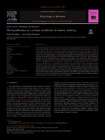
Open access
Date
2020-09-01Type
- Review Article
Abstract
In the brain, long-term memories correspond to changes in synaptic weights after certain patterns of neural activity. Behaviourally, this corresponds to a change in action evoked by a repeating experience. Forming and updating memories (learning, remembering, forgetting) is fundamental for most aspects of cognitive and motor performance. The roles of the cortex, hippocampus, and amygdala have been studied extensively in this context. However, the lateral hypothalamus – a brain-wide projecting region traditionally known as a nutrient-sensor and controller of arousal and motivation – is also critical for updating many types of associative and non-associative memories. Does the hypothalamus play a primary role in learning, or are hypothalamic effects on learning secondary to changes in brain state such as attention/motivation? We argue that such primary and secondary effects are distinguishable under experimental conditions where attention/motivation states are constant or absent, e.g. during sleep or in reduced in vitro preparations. The documented control by hypothalamus-unique transmitters, such as orexin and MCH, of synaptic strength in isolated brain slice preparations implies a primary role for the hypothalamus in synaptic weight updating, rather than a secondary role due to changes in arousal/attention/motivation states (which are absent in brain slices). Such hypothalamic control of memory-related synaptic machinery may enable gating/thresholding/permissive/tagging operations within yet poorly defined logic gates for memory updating. Hypothalamic signals may thus facilitate cost-benefit analysis of learning and memory in real-world settings. Whether the hypothalamus controls only specific types of learning, or broadcasts a global signal for memory updating, remains to be elucidated. Show more
Permanent link
https://doi.org/10.3929/ethz-b-000418982Publication status
publishedExternal links
Journal / series
Physiology and BehaviorVolume
Pages / Article No.
Publisher
ElsevierSubject
Hypothalamus; Learning; Memory; Melanin-concentrating hormone; Orexin; Hypocretin; Arousal; Anxiety; Fear; Food; Reward; Punishment; Reinforcement; Associative learning; Non-associative learning: Energy balance; Neuropeptides; NutrientsOrganisational unit
09589 - Burdakov, Denis / Burdakov, Denis
More
Show all metadata


